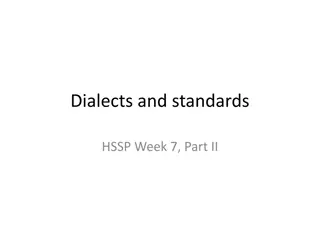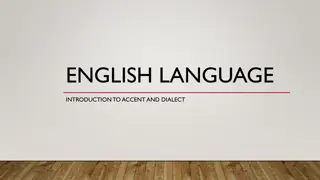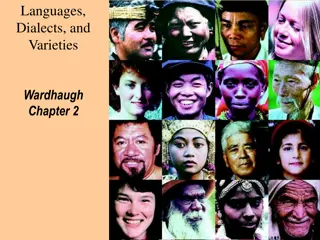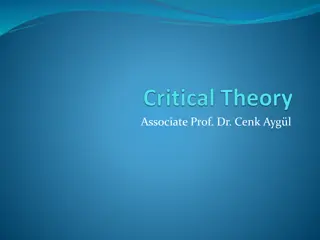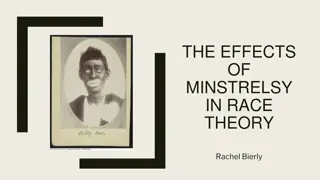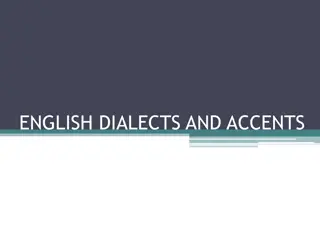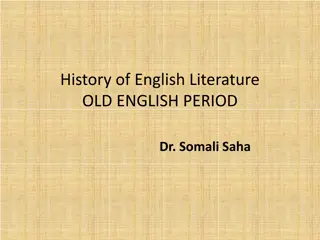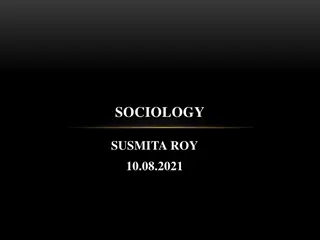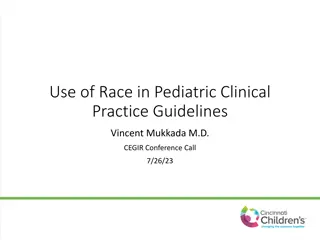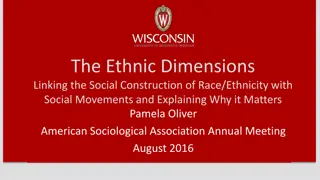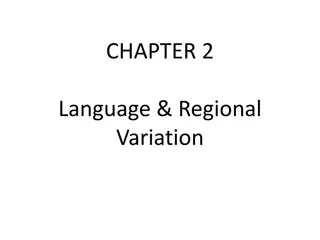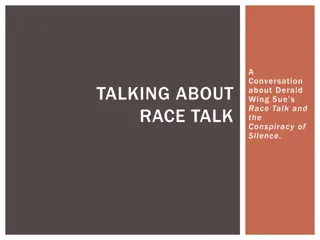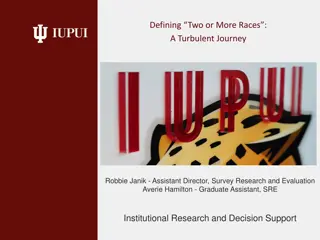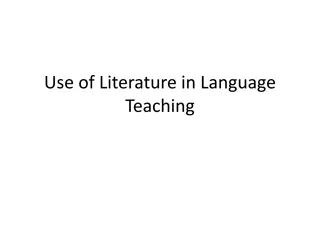Exploring Language, Dialects, and Critical Race Theory in Literature
Delve into the complexities of language diversity, dialects, and critical race theory through literary works such as "Huck Finn" and "Brown Girl Dreaming". The discussions cover topics like the right way to speak, perceptions of dialects in literature, the power dynamics of language, and societal attitudes towards accents. Understand the intersections of language, identity, and privilege in a thought-provoking exploration.
Download Presentation

Please find below an Image/Link to download the presentation.
The content on the website is provided AS IS for your information and personal use only. It may not be sold, licensed, or shared on other websites without obtaining consent from the author. Download presentation by click this link. If you encounter any issues during the download, it is possible that the publisher has removed the file from their server.
E N D
Presentation Transcript
Huck Finn,Language Awareness, and Critical Race Theory Lesson 1
Critical Race Theory Review 1. Race is everywhere. 2. Counterstories are important. 3. Whiteness is the dominant perspective; confers certain privileges and benefits. 4. Intersectionality shapes people s experiences. 5. Striving for social justice (action/agency) is the heart of critical race theory.
Quick Write. What is the right way to speak ? Why? How would you describe your own dialect? How would people from other regions describe it? How does your dialect align with the right way to speak ?
Brown Girl Dreaming Woodson s poem The Right Way to Speak What is the right way to speak as presented in this passage? Provide textual evidence. How does this passage align with your own perceptions of correct language? What commentaries does this passage make with regards to the intersections of language and power?
Huck Finn,Language Awareness, and Critical Race Theory Day 2
Dialect and Huck Finn What are your perceptions of Jim s dialect? What about Huck s dialect?
Everyone Has an Accent As a class, read Everyone Has an Accent (https://www.tolerance.org/magazine/fall-2000/everyone-has-an-accent) If people come from a socially oppressed group, they can count on having their language stigmatized; if they belong to a prestigious group, their language will carry prestige value (Wolfram, 2000, p. 226). How have you seen these sentiment realized in your own personal/educational experiences?
What is a Dialect? A neutral label to refer to any variety of a language that is shared by a group of people Grammar Pronunciation Vocabulary Discourse routines
The Challenge of Language Diversity The most persistent sociolinguistic challenge in all venues of education and public life continues to be the widespread application of the principle of linguistic subordination Discrimination based on language variation is so commonly accepted, so widely perceived as appropriate, that it must be seen as the last back door to discrimination. And the door stands wide open. --Lippi Green (1997)
The social consequences: The case of linguistic profiling Definition: Using vocal cues to identifying the probable ethnicity or social affiliation of a person (often over the telephone) and then discriminating against that person because of a perceived ethnic or social affiliation Can happen in many contexts, including employment, housing, access to services, criminal convictions Estimated to be between 2 to 4 million cases annually of linguistic profiling related to housing (between 6,000 to 10,000 cases per day) Fair Housing Act: Sec. 804. [42 U.S.C. 3604 a-f] It shall be unlawful (b) To discriminate against any person in the terms, conditions, or privileges of sale or rental of a dwelling, or in the provision of services or facilities in connection therewith, because of race, color, religion, sex, familial status, or national origin.
An Example of Linguistic Profiling From the Department of Housing and Urban Development
Language and Law: Zimmerman Case Rachel Jeantel s testimony
Love to hear her give a Shakespeare recital. To beez or nots to beez, dats wat I'zz bee saying, jack .
Rachael Jeantels Testimony These were comments that exploded in the Twitterverse mere minutes into Jeantel's testimony. Why? Part of it is because she is a dark-skinned, plus-sized girl from a low-income neighborhood who doesn't speak the King's English. With that profile, some viewers automatically see her as non-credible and uneducated, and every frustrated or irritable word coming out of her mouth reinforced the stereotypes of black teens that all too many Americans (of all colors) believe in. http://www.cnn.com/2013/06/27/opinion/zimmerman-jeantel/
Rachel Jeantels language in the Zimmerman trial, Rickford (2013) Jeantel s Black English has rules as complex as the mainstream English. -Linguist John McWhorter Jeantelspeaks fluent African American Vernacular English (AAVE), or Ebonics court stenographer, attorneys and jury members may have missed crucial elements in her testimony. -- Jeantel: It s how I speak.
Rachel Jeantels language in the Zimmerman trial, Rickford (2013) Speakers of AAVE and linguists who have studied this distinctive variety for more than 50 years. Systematic AAVE features include: Stressed BIN, as in I was BIN paying attention, sir, meaning, I ve been paying attention for a long time, and am still paying attention. Preterit HAD, ax, and inverted did in embedded sentences, as in He had ax me did I go to the hospital for He asked me whether I had gone to the hospital. Absence of auxiliary IS: He trying to get home, sir. Absence of possessive and third present s,as in He a momma boy and He love his family.
Chris Hayes And Linguistics Expert Break Down Rachel Jeantel's 'Articulate' Use Of Black English https://www.mediaite.com/tv/chris-hayes-and-linguistics-expert-break-down- rachel-jeantels-articulate-use-of-black-english/
Seven Privileges of Standardized English ( Understanding English Language Variation in U.S. Schools by Anne H. Charity Hudley and Christine Mallinson p.36) 1. Standardized English speaking students can usually be assured that the newspapers, magazines, books, and other media they encounter at school will be in the type of English they are already familiar with 2. Standardized English speaking students can usually be assured that they will not be mocked or teased for how they pronounce words 3. Standardized English speaking students can usually be assured that they will not be thought of as being less intelligent because of how they talk 4. Standardized English speaking students can usually be assured that standardized test instructions and materials will be written in the English they are already familiar with 5. Standardized English speaking students can usually be assured that most of their educators will communicate with them in the type of English the students are already familiar with 6. Standardized English speaking students can generally be assured that the way they talk will not be the subject of jokes or belittling in mainstream TV shows or movies 7. Standardized English speaking students can generally be assured that their pronunciation, intonation, and sentence structure will not interfere with their ability to be assessed accurately, to interact with authority figures, or later in life, to obtain housing and be hired for a job.
DYSA African American English (or Ebonics) in the classroom https://www.youtube.com/watch?v=xX1-FgkfWo8
Huck Finn and Dialect After learning about dialect and power, what do you think of Jim s dialect? What do you think about Huck s dialect?
NCTE/CCCCs Stances on Language Diversity in the Classroom (National Council of Teachers of English/ Conference on College Composition and Communication) The claim that any one dialect is unacceptable amounts to an attempt of one social group to exert its dominance over another. Such a claim leads to false advice for speakers and writers, and immoral advice for humans. A nation proud of its diverse heritage and its cultural and racial variety will preserve its heritage of dialects. We affirm strongly that teachers must have the experiences and training that will enable them to respect diversity and uphold the right of students to their own language. (CCCC/NCTE, 1974)
On your sheet 1. What are three things you learned today about dialects, language, and/or CRT? a. b. c.



